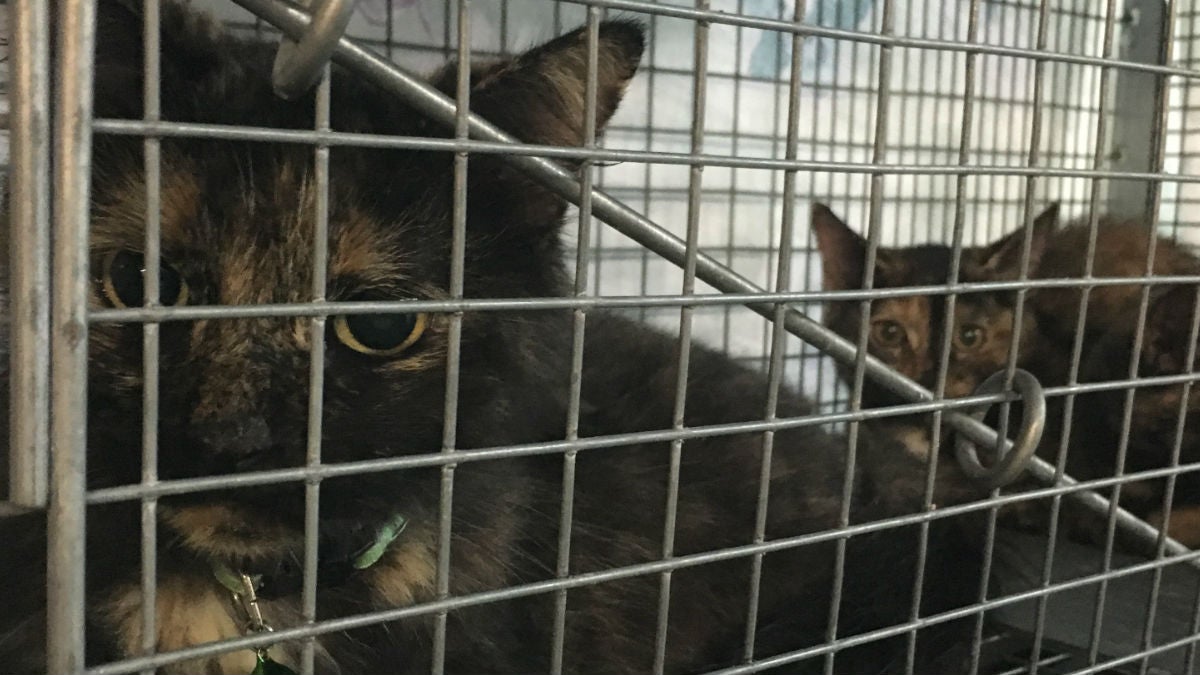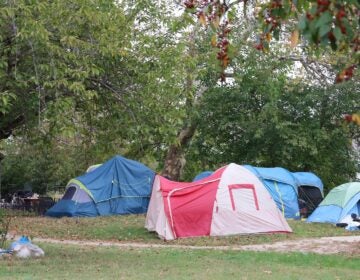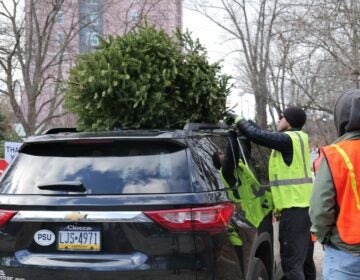Tackling Delaware’s feral cat colonies

A pair of feral cats await sterilization surgery at Forgotten Cats clinic in Trainer
A $200,000 PetSmart grant helps Forgotten Cats capture and sterilize thousands of Delaware kitties in an effort to keep their numbers from increasing beyond current levels.
You’ve probably seen the cats running around your neighborhood, maybe living behind the strip mall or in a wooded area nearby. Delaware is home to hundreds of feral cats and for more than a year, a group of mostly volunteers has been working hard to limit their numbers.
More than 10,000 free-roaming cats are believed to live just in the northern Delaware communities of New Castle, Newark and Bear. Felicia Cross, founder of Forgotten Cats, is working to control those numbers.
When called by residents, volunteers with Forgotten Cats will place traps where a feral cat colony lives. “We’re going to bait a couple of these and take them around,” Cross said during a recent trapping trip. “You want to be very quiet and walk them in and place them and leave.”
The goal is to interrupt the reproductive process and reduce the colony population. Forgotten Cats accomplishes that by capturing all cats within a colony. That process usually takes a few days, but if all cats aren’t sterilized, reproduction may be slowed, but it will continue.
“Most caretakers that are feeding them, they don’t intend to have a colony,” Cross said. “They find one or two cats, and they start feeding them and the next thing you know, there’s a litter, and the litter has a litter and before you know it the litter goes out of control.”
But as quick as it can get out of control, with the proper method, the expansion of a colony can be arrested just as quickly. “Within a week, a colony of two or 52 can be sterilized and under control,” Cross said.
Here’s how it works: once caught, the captured kitties are taken to one of Forgotten Cats’ clinics just north of the Delaware border in Trainer, Pa. The cats are then sterilized, spayed or neutered and vaccinated.
After years of sterilizing up to 100 cats a day, the clinic runs like a well-oiled machine. From sedating the cats in their cage, to shaving them in preparation for surgery, then it’s in to the operating room in a matter of minutes.
Doctor Jackie Martin has single-handedly sterilized roughly 50,000 over the past 10 years at Forgotten Cats. “I usually average between 60 and 85 a day. And on really busy summer days, I’ve done over 110, so that’s about the record,” Martin said. “The boy cats are much easier, I can do a boy cat in about 20 seconds. The girl cats are definitely more time consuming.” After surgery it’s out to the recovery room, and then eventually back to the wild for some. Others are put up for adoption if they’re deemed friendly enough.
In 2015, Forgotten Cats was awarded a PetSmart grant of $200,000 to target cat populations in Bear, Newark and New Castle. That funding appears to be paying off. The grant was to fund 4,000 sterilizations from those communities, so far, 3,000 cats have been sterilized. “The calls from the grant areas have slowed down considerably,” Cross said. “I’m not sure if that’s because kitten season is over and it’s not an urgency anymore, or it’s because there aren’t that many unsterilized colonies out there. I’m hoping that’s the case.”
In the not too distant future, Forgotten Cats expects to sterilize its100,000th cat since it started more than ten years ago, and it’s not just reducing the population, it’s improving quality of life for these animals. “Not only are we preventing an overpopulation of cats, we’re also preventing the cruelty that these cats will have to endure had they been born on the streets,” Cross said. “It’s solving the problem instead of band-aiding the problem.”
And as with any non-profit, Forgotten Cats is always looking for help, both in the form of donations and from volunteers. “Our overhead is astronomical. Just look at the number of cats around here,” Cross said.
Delaware residents who know of feral cat colonies in ZIP codes 19701, 19702, 19711, 19713 and 19720 can call Forgotten Cats for help at 302-429-0124.
WHYY is your source for fact-based, in-depth journalism and information. As a nonprofit organization, we rely on financial support from readers like you. Please give today.





